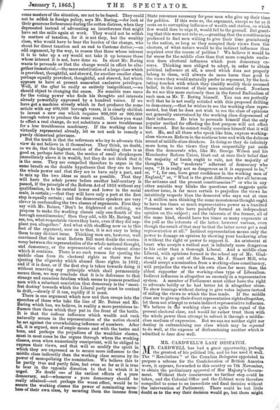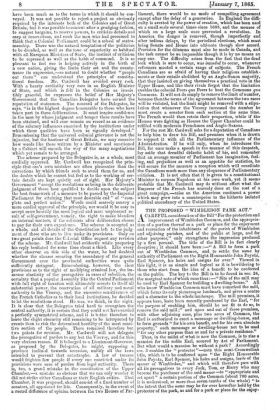MR. CARDWELL'S LAST DESPATCH.
11-R. CARDWELL has had a great opportunity, perhaps 1,1 the greatest of his political life, and he has used it well. The " Resolutions " of the Canadian Delegates appointed to prepare a scheme for the Confederation of British America were, it appears, forwarded to this country on 7th November, to obtain the preliminary approval of Her Majesty's Govern- ment. Without their concurrence no further step could be taken, and the Colonial Office and the Cabinet were therefore compelled to come to an immediate and final decision without the intervention of Parliament. There could be but little doubt as to the way their decision would go, but there might. have been much as to the terms in which it should be con- veyed. It was not possible to reject a project so obviously required by the interests both of the Colonies and of Great Britain, but it was possible to consent after a grudging fashion, to suggest bargains, to reserve powers, to criticize details and carp at innovations, and snub the men who had presumed to think that a Colonial Parliament could be a school of states- manship. There was the natural temptation of the politician to be dreaded, as well as the tone of superiority so habitual with all European Ministers of State, the instinct of criticism to be repressed as well as the habit of command. It is so pleasant to feel one is helping actively in the birth of a new nation, giving the limbs their set and the counte- nance its expression,—so natural to doubt whether "people out there" can understand the principles of constitu- tional freedom. Mr. Cardwell has avoided every rock. With a hearty cordiality very rare in an English Minister of State, and which is felt in the Colonies as irresis- tibly graceful, he expresses the belief of Her Majesty's Government that the Canadian Delegates have earned the reputation of statesmen. The concord of the Delegates, he says, "is in the highest degree honourable to those who have taken part in these deliberations. It must inspire confidence in the men by whose judgment and temper these results have been attained, and will ever remain on record as an evidence of the salutary influences exercised by the institutions under which these qualities have been so signally developed." Remembering that the universal colonial grievance is not the injustice, but the hauteur of Great Britain, we may conceive how words like these written by a Minister and sanctioned by a Cabinet will smooth the way of the many negotiations which yet remain to be arranged.
The scheme prepared by the Delegates is, as a whole, most cordially approved. Mr. Cardwell has recognized the prin- ciple that one's own mistakes are often pleasanter than the corrections by which friends seek to avoid them for us, and the doubts which he cannot but feel as to the working of cer- tain details are kept quietly out of sight. Her Majesty's Government " accept the resolutions as being in the deliberate judgment of those best qualified to decide upon the subject the best framework of a measure to be passed by the Imperial Parliament for attaining that most desirable end " of "com- plete and perfect union." Words could scarcely convey a more cordial approval of the principle, nor would it be easy to accept more heartily the most logical and most unpleasant re- sult of self-government, namely, the right to make blunders on internal matters, if the colonists after deliberation choose to pay for their own experience. The scheme is accepted as a whole, and all details of the Constitution left to the judg- ment of those who are to live under its provisions. Only on two great points does the C.dunial Office request any revision of the scheme. Mr. Cardwell had evidently while preparing his reply hesitated for some time about a third. Like every other observer on this side of the water, he had doubted whether the clauses securing the ascendancy of the general Government over the provincial authorities were quite sufficiently stringent. Remembering, however, the clear provisions as to the right of modifying criminal law, the im- mense elasticity of the prerogative in cases of rebellion, the certainty that a popular Assembly like the Central Parliament with full right of taxation will ultimately accrete to itself all substantial power, the reservation of all military and naval authority to the Viceroy, and the excessive sensitiveness of the French Catholics as to their local institutions, he decided to let the resolutions stand. He was, we think, in the right. It is clear that the Delegates tried hard to strengthen the central authority, it is certain that they could not have carried a perfectly symmetrical scheme, and it is better therefore to leave the slight obscurity still remaining to be interpreted by events than to risk the determined hostility of the most sensi- tive section of the people. There remained therefore but two points for revision. Mr. Cardwell will not delegate the prerogative of pardon to any but the Viceroy, and for this very obvious reason. If it belonged to a Lieutenant-Governor, as proposed by the Delegates, he might, supposing a province inclined towards secession, nullify all the laws intended to prevent that catastrophe. A law of treason would frighten few people if every one convicted under its provisions were sure of pardon from legal authority. There is, too, a grand mistake in the constitution of the Upper Chamber,—a mistake so obvious that we can only wonder it did not strike either Canadians or their English critics. That Chamber, it was proposed, should consist of a fixed number of senators, all appointed for life. Consequently, in the event of a rooted difference of opinion between the two Houses of Par- liament, there would be no mode of compelling agreement except after the delay of a generation. In England the diffi- culty is averted by the power of creation, which has been used on a small scale several times since 1688, and the menace of which on a large scale once prevented a revolution. In America the danger is removed, though imperfectly and after tedious delays, by the periodical elections, which must bring Senate and House into ultimate though slow accord. Provision for the dilemma must also be made in Canada, and the task cannot be an impossible though it is by no means an easy one. The difficulty arises from the fact that the dead lock which is sure to occur, was intended to occur, whenever reformers mooted a certain range of subjects. The French Canadians are so afraid of having their religious establish- ments or their entails abolished by an Anglo-Saxon majority, that they insisted on giving themselves a practical veto in the Upper House, and like their rivals forgot that the limitation enables the colonial Peers qua Peers to beat the Commons qua Commons. It will not do simply to remove the limit of number, because then the terms of the agreement between the two races will be violated, but the limit might be removed with a stipu- lation that whenever the Viceroy increased the number he must create a senator from each section at the same time. The French would then retain their proportion, while if the Houses were fighting as Houses the Upper Chamber could be refilled with moderate Frenchmen and Anglo-Saxons.
For the rest Mr. Cardwell asks for a deputation of Canadians to help him to draw his Bill, and promises when it is drawn to support it with all the Parliamentary influence of the Administration. If he will only, when he introduces the Bill, for once make a speech in the manner of this despatch, lay aside that dreadful didactic habit of his, and remember that an average member of Parliament has imagination, feel- ing, and prejudices as well as an appetite for statistics, he will secure for the measure a reception which will conciliate the Canadians much more than any eloquence of Parliamentary criticism. It is not often that it is given to a constitutional Minister to surpass Napoleon at his own work, yet it seems probable that Mr. Cardwell may do without effort what the Emperor of the French has scarcely done at the cost of a great campaign,—raise on the American continent a power which may grow into a counterpoise to the hitherto isolated political ascendancy of the United States.





































 Previous page
Previous page